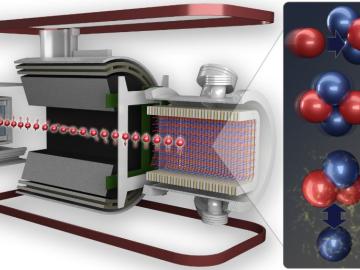
Filter News
Area of Research
- Advanced Manufacturing (1)
- Biological Systems (1)
- Biology and Environment (65)
- Computational Biology (1)
- Computational Engineering (1)
- Computer Science (1)
- Energy Science (47)
- Fusion and Fission (7)
- Fusion Energy (1)
- Isotopes (5)
- Materials (47)
- Materials for Computing (3)
- National Security (24)
- Neutron Science (30)
- Nuclear Science and Technology (10)
- Quantum information Science (2)
- Supercomputing (62)
News Type
News Topics
- (-) Advanced Reactors (24)
- (-) Bioenergy (93)
- (-) Biomedical (59)
- (-) Clean Water (18)
- (-) Cybersecurity (31)
- (-) Physics (60)
- (-) Summit (62)
- 3-D Printing/Advanced Manufacturing (104)
- Artificial Intelligence (112)
- Big Data (53)
- Biology (106)
- Biotechnology (35)
- Buildings (45)
- Chemical Sciences (70)
- Composites (23)
- Computer Science (174)
- Coronavirus (36)
- Critical Materials (16)
- Education (5)
- Element Discovery (1)
- Emergency (3)
- Energy Storage (75)
- Environment (154)
- Exascale Computing (64)
- Fossil Energy (7)
- Frontier (60)
- Fusion (54)
- Grid (48)
- High-Performance Computing (113)
- Hydropower (6)
- Isotopes (53)
- ITER (6)
- Machine Learning (50)
- Materials (111)
- Materials Science (111)
- Mathematics (8)
- Mercury (9)
- Microelectronics (4)
- Microscopy (40)
- Molten Salt (5)
- Nanotechnology (46)
- National Security (78)
- Neutron Science (136)
- Nuclear Energy (94)
- Partnerships (67)
- Polymers (22)
- Quantum Computing (48)
- Quantum Science (79)
- Security (28)
- Simulation (52)
- Software (1)
- Space Exploration (16)
- Statistics (3)
- Transportation (56)
Media Contacts

The Transformational Challenge Reactor, or TCR, a microreactor built using 3D printing and other new advanced technologies, could be operational by 2024.

Popular wisdom holds tall, fast-growing trees are best for biomass, but new research by two U.S. Department of Energy national laboratories reveals that is only part of the equation.

Geoffrey L. Greene, a professor at the University of Tennessee, Knoxville, who holds a joint appointment with ORNL, will be awarded the 2021 Tom Bonner Prize for Nuclear Physics from the American Physical Society.

Four research teams from the Department of Energy’s Oak Ridge National Laboratory and their technologies have received 2020 R&D 100 Awards.


Rufus Ritchie came from Kentucky coal country, a region not known for producing physicists.

Through a one-of-a-kind experiment at ORNL, nuclear physicists have precisely measured the weak interaction between protons and neutrons. The result quantifies the weak force theory as predicted by the Standard Model of Particle Physics.

The combination of bioenergy with carbon capture and storage could cost-effectively sequester hundreds of millions of metric tons per year of carbon dioxide in the United States, making it a competitive solution for carbon management, according to a new analysis by ORNL scientists.

Prometheus Fuels has licensed an ethanol-to-jet-fuel conversion process developed by researchers at Oak Ridge National Laboratory. The ORNL technology will enable cost-competitive production of jet fuel and co-production of butadiene for use in renewable polymer synthesis.


